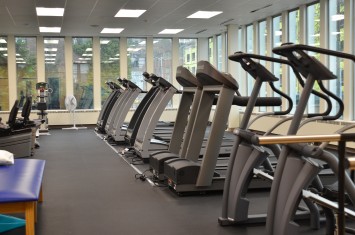Structured Intensive Multidisciplinary Program
 The Rehabilitation Institute of Washington Structured Intensive Multidisciplinary Program (SIMP) has been designed to help people who have disabling chronic pain.
The Rehabilitation Institute of Washington Structured Intensive Multidisciplinary Program (SIMP) has been designed to help people who have disabling chronic pain.
When pain has interfered with work or home activities, has lead to loss of fitness and health, weight gain, depression, or overuse of medications, a rehabilitation approach becomes necessary to successfully reverse these changes.
Rehabilitation at RIW is a comprehensive approach, designed to treat all the factors that influence disability and pain. The methods used in this program may be different from those that have been tried in the past. Our approach involves helping you learn skills that will allow you to better manage and cope with pain in the future.
The Evaluation
An initial comprehensive evaluation will determine whether a pain management program or some other treatment approach is best for each patient. The evaluation involves a half-day appointment during which the patient will meet with a rehabilitation physician, a pain psychologist and a vocational rehabilitation counselor.
Usually at the end of this evaluation, the patient and doctors will decide if the Structured Intensive Multidisciplinary Program is the right treatment. Sometimes a brief second appointment is necessary if additional medical information is needed to recommend appropriate treatment.
The Program
 The treatment program is designed for each patient’s particular problems and needs. Patients will work with a team of rehabilitation specialists including a physician, a pain psychologist, a vocational counselor, and occupational and physical therapists.
The treatment program is designed for each patient’s particular problems and needs. Patients will work with a team of rehabilitation specialists including a physician, a pain psychologist, a vocational counselor, and occupational and physical therapists.
All programs include physical exercise and reconditioning in the form of stretching, strengthening and cardiovascular fitness, instruction in proper body mechanics and psychological strategies for managing pain and the emotional and behavioral changes that often accompany pain.
For those with work-related disabilities, extensive vocational assessment and counseling will be provided to help plan for each person’s vocational future.
The RIW Structured Intensive Multidisciplinary Program is designed to help motivated people with a strong desire to change. The results can be outstanding with this type of team effort.
How Long Does the Program Last?
The program runs Monday through Friday from 9:00 AM to 4:00 PM. At the end of the standard 20-day program, a long-term home exercise program will be designed for the patient. Regular follow-up visits will be scheduled to support the patient’s progress for up to 3 months following completion of the program. If a person is not ready for the full-day program, there is a preliminary phase which is designed to help the patient transition into the full-day program. This is typically 45 minutes of PT and 45 minutes of OT, 5 days/week, for a range of 1-4 weeks. For a more detailed overview of the timeline and services provided see:
Timeline For Structured Intensive Multidisciplinary Program (SIMP) Treatment
Teimpo Del Programa Para Manejo Del Dolor
Who is admitted to the Structured Intensive Multidisciplinary Program?
Individuals treated in the Structured Intensive Multidisciplinary Program have pain and/or disability that continue longer than the normal injury healing time, or longer than three months after an injury. Some have had surgery, and most have had extensive treatment such as physical therapy, chiropractic treatment, medications or injections.
The SIMP program treats those individuals who have not recovered despite these prior treatments. Most patients have continued disability from normal work, social, physical or psychological functioning. Patients accepted for treatment are those considered to have potential to benefit from rehabilitation.
Please see our Orientation Guide for additional information.
To make a referral, please contact Vanessa Quintero, our Musculoskeletal Programs Coordinator, at (206) 859-5030 x1608, or visit our referrals page.
Our Outcomes
Persons served in the SIMP Program improved on all measures. There were improvements in reported pain, pain worry, fear avoidance beliefs, depression, self-reported function and objective measures of function. Individuals treated also reduced their use of opiates, sedatives, alcohol and tobacco.
Persons served in the SIMP reported using more active coping strategies by the end of the program. They decreased their use of guarding, rest breaks, and having to ask for assistance while increasing their use of relaxation techniques, task persistence, exercise, positive coping self-statements, and social support.

